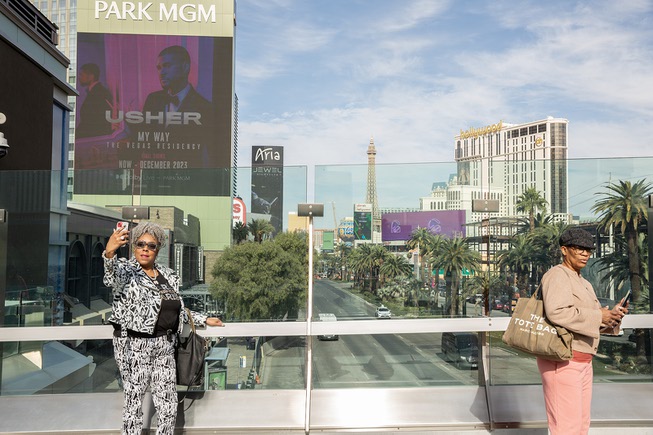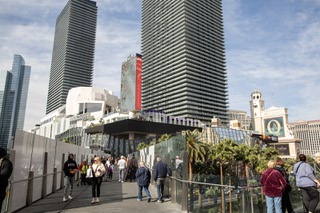
A woman stops to take a selfie on a pedestrians bridge at Las Vegas Blvd. and Park Ave. Wednesday Nov. 29, 2023.
Friday, Feb. 16, 2024 | 12:50 p.m.
The American Civil Liberties Union of Nevada is suing Clark County over an ordinance that bans stopping or standing on pedestrian bridges on the Las Vegas Strip.
In a lawsuit filed Friday in U.S. District Court in Las Vegas, the group says the ordinance makes criminals “out of ordinary people who stop for even a few moments," said Athar Haseebullah, executive director at ACLU of Nevada in a statement. It is seeking an injunction to prohibit Clark County from enforcing.
County commissioners Jan. 3 unanimously approved the ordinance that criminalized pedestrians for stopping, standing or engaging in activities that would cause others to stop on pedestrian bridges.
Offenders face fines of up to $1,000, or six months in jail.
“The Strip Selfie Ban on pedestrian bridges is among the most extreme regulations brought forward in years,” Haseebullah said. “The language of the ordinance is unnecessarily and unconstitutionally overbroad, making harmless conduct illegal.”
The suit was filed on behalf of Lisa McAllister, who has lived for more than 40 years with a spinal cord injury and uses a manual wheelchair to get around, the ACLU said. She sometimes must stop on the bridges when her wheelchair malfunctions or her arms tire, and also stops when crowds prevent her from finding a clear path.
That means she’d be in danger of being cited, they said.
The lawsuit was also filed for violinist Brandon Summers, who has performed on pedestrian bridges near the Horseshoe, MGM Grand and Wynn since 2009, according to the lawsuit.
“Making criminals out of ordinary people who stop for even a few moments, like our client who has to stop periodically because she uses a manual wheelchair, is reckless,” Haseebullah said in a press release. “It’s Clark County’s turn to see us in court.”
The ordinance created “pedestrian flow zones” on the overpasses and up to 20 feet surrounding the connecting stairs or escalators that made stopping, standing or doing anything to cause another person to stop or stand in the zone a violation, according to the text of the ordinance.
County commissioners and Metro Police had concerns about safety on the bridges, which account for less than 6% of the total length of the sidewalk system in the Resort Corridor but account for 11% of the “disorder” calls to Metro, a study found.
William Sousa, a professor in UNLV’s department of criminal justice, analyzed crime data on the bridges and found that calls for law enforcement services on Las Vegas Boulevard increased 29% from 37,589 in 2018 to 48,358 in 2022.
This alleged high level of crime can affect people’s perceptions of safety while on the pedestrian bridges and lead to even more crime, Sousa said.
The narrowness of the bridges and limited entry or exit points also make them susceptible to causing crowd crush — when people become so packed into one area that they can suffer injuries or even die.
County counsel noted that an exception is included in the ordinance for people who have to stop while waiting to use stairs or escalators near the bridges.
Lisa Logsdon, counsel for Clark County, also noted that the ordinance’s language, after working with the Culinary Union, was clarified to specify that any unintended stoppage on the bridges due to picketing activity on the street-level sidewalk would not be in violation of the ordinance.
The ACLU of Nevada has been critical of the ordinance “since its inception,” they said in a statement.
In January, Haseebullah told the commission his group would litigate the ordinance on First Amendment grounds, which the county argues is incidental. He also explained that the crime research is not specific enough and will now only rise with the county deciding “to criminalize the mere act of stopping.”
The organization believes the ordinance is “unconstitutionally vague and opens the door to selective and discriminatory enforcement,” especially with the notion that enforcement won’t occur against selfie-takers.
Clark County in the hours after approving the ordinance issued a statement to clarify its intentions.
“This is not interpreted to mean that tourists and locals cannot take photos along the Boulevard while on a pedestrian bridge, but rather is intended to maintain the safe and continuous movement of pedestrians on the bridges to ensure pedestrian safety on the bridges,” it read.
Haseebullah said the ruling has “a lack of clarity about what conduct is even prohibited” because selfie-takers are encompassed by the ordinance’s language but may not be targeted according to Clark County’s statement.
The ACLU also said the ordinance “fails to accommodate protected First Amendment activities such as holding political signs” and “violates the First Amendment and Fourteenth Amendment of the U.S. Constitution.”
A Clark County spokesperson today said they don’t comment on pending litigation.

